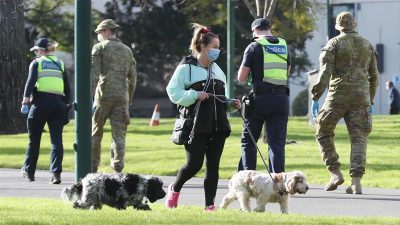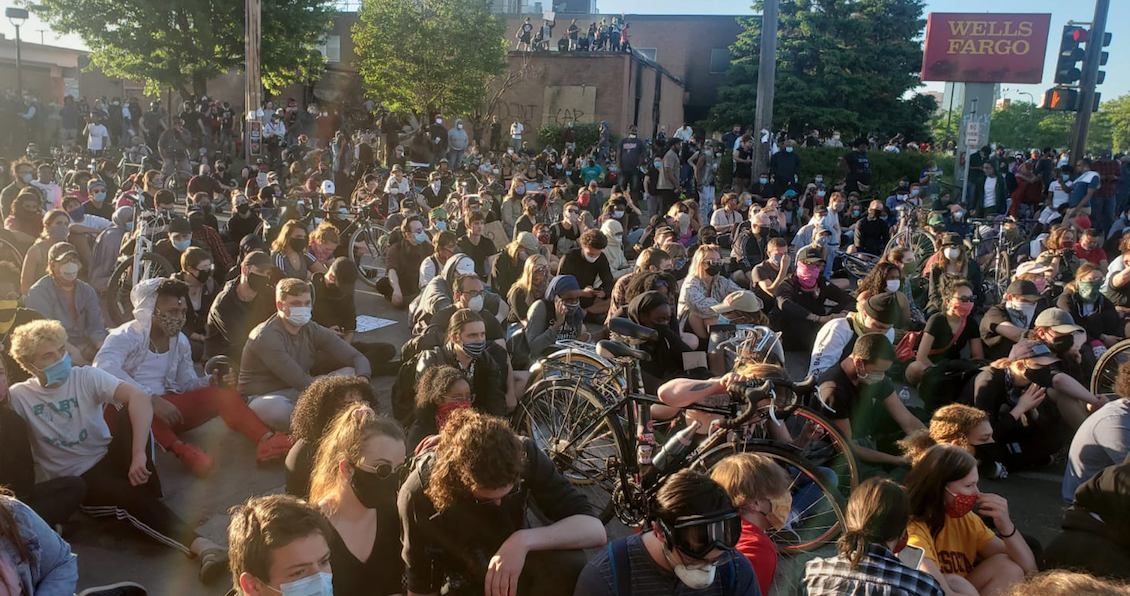20 October 2020 — Spycops
As we prepare for the public inquiry hearings in two weeks’ time, it’s a very busy period in the campaign for truth and justice about Britain’s political secret police. Continue reading
20 October 2020 — Spycops
As we prepare for the public inquiry hearings in two weeks’ time, it’s a very busy period in the campaign for truth and justice about Britain’s political secret police. Continue reading
23 August, 2020 — Global Research

Mayhem in Melbourne
On August 2, lockdown measures were implemented in Melbourne, Australia, that were so draconian that Australian news commentator Alan Jones said on Sky News: “People are entitled to think there is an ‘agenda to destroy western society.’”
19 March, 2020 — Netpol
[I missed this. WB]

PHOTO: Brian A Jackson | Shutterstock
While everyone is currently very anxious about the future, it is important that any emergency response the government plans to adopt and implement to contain the coronavirus is fair and proportionate.
3 June 2020 — Internationalist 360°
 Protesters sit in front of Minneapolis 5th police precinct, Saturday, May 30, 15 minutes before 8 p.m. curfew. Both a split-off march and this sit-in were heavily tear-gassed by police minutes later. | Liberation photo: Kei Pritzker
Protesters sit in front of Minneapolis 5th police precinct, Saturday, May 30, 15 minutes before 8 p.m. curfew. Both a split-off march and this sit-in were heavily tear-gassed by police minutes later. | Liberation photo: Kei Pritzker
Trump declared last night from the White House that he would “end the riots” with a national military mobilization to “dominate the streets” and that “if a city or state refuses to take the actions that are necessary,” he would “deploy the United States military and quickly solve the problem for them.”
20 July 2019 — Strategic Culture Foundation
It’s not just that the United States has a higher percentage of its people in prison than does any other nation on the planet. (El Salvador — the land that was largely made what it today is, by its US trained-and-equipped death squads — is now number 2 on that measure. In another country the US controls, Honduras, protesters tried to burn down the US Embassy on 31 May 2019.)
30 November 2014 — Global Research
The world is watching what is happening in Ferguson, Missouri. After the announcement by the grand jury that Officer Darren Wilson was acquitted for the shooting death of Michael Brown, angry residents took to the streets of Ferguson and other towns and cities across the U.S. to protest police brutality. The U.S. government has the FBI, the Department of Homeland Security (DHS) along with the Ferguson police department and the Missouri National guard ready to confront the angry protesters with force.
22 July 2014 – RT
British journalists who publish politically motivated content could be labeled terrorists if UK authorities deem the material to be a threat to public safety, according to Britain’s counter-terrorism watchdog.
10 July 2014 — The Greanville Post
Want to hear the worst idea in the history of horrible ideas? How about we take the industry responsible for destroying the U.S. economy and wrecking the lives of tens of millions of people, and then allow it to create a “government-industry cyber war council.”It appears that trillions in taxpayer bailouts simply wasn’t enough for Wall Street.
10 July 2014 — WSWS
European governments are working together to prepare to militarily suppress social unrest. This effort—involving legal, technical, as well as military plans—is in an advanced stage of development, according to a report by Aureliana Sorrento that aired on June 20 on Germany’s Deutschlandfun k radio station . “In the framework of collaborative foreign and security policy,” the introduction on Deutschlandfunk’s web site reads, “military and police responsibility are increasingly blurred and the capacity to combat social uprisings is being built up.” Officially, this concerns campaigns in countries outside the European Union, the web site notes, “but with Article 222 of the Lisbon Treaty, the legal conditions for the deployment of military and paramilitary units in the EU [European Union] crisis states were satisfied.”
29 June 2014 — 911forum.org.uk/
The EU creates a legal framework for Europe-wide deployment of police and military units. At the same time, the EU Commission is working intensively on the creation of a single EU police unit as well as an EU public prosecutor.
20 June 2014 — Boiling Frogs Post
“A standing military force, with an overgrown Executive will not long be safe companions to liberty.”—James Madison
“Here [in New Mexico], we are moving more toward a national police force. Homeland Security is involved with a lot of little things around town. Somebody in Washington needs to call a timeout.” —Dan Klein, retired Albuquerque Police Department sergeant
16 January 2014 — Memory Hole
Photos and Eyewitnesses Confirm BOTH Boston Marathon Bombs Were Fake
This brief (9:47) video presents a compelling argument and set of video and photographic evidence concerning the incendiary devices detonated shortly before 3:00PM on April 15, 2013 at the Boston Marathon finish line.
8 January 2014 — WSWS
Early Saturday morning, police in the northern German city of Hamburg declared the entire district of St. Pauli and large parts of Altona, Eimsbuettel and Sternschanze to be a “no-go zone.” The announcement of such a broad “no-go area” is unprecedented in German post-war history. In such areas police officers are entitled to arbitrarily check and search any individual and demand they leave the zone.
17 November 2013 — williambowles.info
Wikipedia calls a police state one “in which the government exercises rigid and repressive controls over the social, economic, and political life of the population.”
15 November 2013 — RT
UK security forces wanted to launch a covert operation to spy on political activists among Cambridge University students, footage obtained by the Guardian reveals. Police contacted a young activist and promised him money for spying. Continue reading
14 November 2013 — New Left Project
Former NSA contractor Edward Snowden has revealed the existence of an international network of mass surveillance in which Britain’s GCHQ plays a central role, working closely with European partners, but subordinate to the United States. Stephen Dorril is the founding co-editor of Lobster and a lecturer at the University of Huddersfield. He has worked as an author, researcher and investigative journalist specialising in intelligence since 1986 and is the author of a number of books on intelligence and British politics including MI6: Inside the Covert World of Her Majesty’s Secret Intelligence Service. He spoke to NLP’s Tom Mills about the Snowden revelations, corporate power and the origins of British intelligence and the ‘special relationship’. Continue reading
9 November 2013 — WSWS
The High Court in London concluded a two-day hearing Thursday after David Miranda, the Brazilian partner of the former Guardian journalist Glenn Greenwald, challenged his nine-hour detention under anti-terror legislation at Heathrow Airport on August 18 as unlawful.
4 November 2013 — WSWS
Are we living in a police state or what?
“[T]he disclosure [of Documents], or threat of disclosure, is designed to influence a government and is made for the purpose of promoting a political or ideological cause. This therefore falls within the definition of terrorism.” – Scotland Yard
The US and British governments have stepped up their campaign of repression and victimization against Edward Snowden and his allies for exposing the worldwide police-state spying by the US National Security Agency and the British GCHQ (Government Communications Headquarters).
The following timeline of the April 15 Boston Marathon bombing that killed three and injured many more provides a platform to better understand how the event was publicly presented by corporate and alternative news media. The chronological assemblage of coverage is not comprehensive of all reports published on the incident but is an ongoing project that also seeks to explain how the storyline was largely constructed by federal and state law enforcement, medical authorities and major media around the eventual theory that Dzokhar and Tamarlan Tsarnaev were the sole instigators of the bombing.
13 August 2013 — Prof. James Petras
Introduction
Representative democracies and autocratic dictatorships respond to profound internal crises in very distinctive ways: the former attempts to reason with citizens, explaining the causes, consequences and alternatives; dictatorships attempt to terrorize, intimidate and distract the public by evoking bogus external threats, to perpetuate and justify rule by police state methods and avoid facing up to the self-inflicted crises.